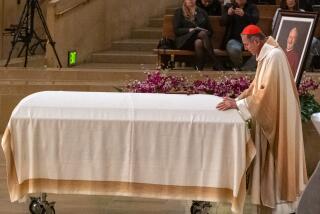Medina Drops Insanity Plea in Murders After Doctors’ Examination
- Share via
The Arizona parolee convicted last month of first-degree murder in the deaths of three convenience store clerks dropped his insanity defense Monday after all four doctors who interviewed him said he was not insane.
Teofilo (Junior) Medina, 43, now faces a penalty phase trial, scheduled to begin Wednesday, in which jurors will decide between a death sentence or imprisonment for life without parole.
The jurors who found Medina guilty on Oct. 17 were awaiting the insanity plea phase of the trial Monday when Medina’s lawyers asked Superior Court Judge James K. Turner to let him withdraw his plea.
“We filed the insanity plea in good faith because the doctors who had talked to him did say he had mental impairment,” said Ronald P. Kreber, one of Medina’s attorneys. Kreber added that he had hoped further medical interviews with Medina might show more about his mental state.
No Details Obtained
Medina has refused in interviews with the doctors--three psychiatrists and one psychologist--to admit any details of the crimes. His lawyers say he doesn’t deny the crimes but simply doesn’t recall any of them.
“It would be to Junior’s advantage if he could recall because it would provide the doctors with more information,” Kreber said.
Under state law, a defendant can be found insane if he does not understand the “nature and quality” of his act and did not know it was wrong.
Medina was arrested at a sister’s home in Lake Elsinore on Nov. 7, 1984, shortly after an attempted robbery of a Santa Ana convenience store. Two passers-by had chased his car and had written down his license plate number. Police found a gun in his jacket when he was arrested that experts later said had been used in four convenience store killings between Oct. 18 and Nov. 5, 1984.
Prosecutors also found witnesses who had seen a car similar to Medina’s at the locations of two of the robberies. Medina’s fingerprints were found at the scene of one of the murders. And Medina had confessed at least some of the crimes to one of his sisters.
Fourth Murder
Medina was convicted on three of the murders, all in Orange County. The fourth murder, which occurred in Corona, is scheduled to be brought before jurors during the penalty phase. However, Kreber said he would file a motion attempting to block prosecutors from presenting that evidence to the jury.
The three Orange County victims were Horacio H. Ariza, 20, killed at a Santa Ana Arco mini-mart on Oct. 18; Douglas M. Metal, 23, killed at a drive-in dairy in Garden Grove on Nov. 4, and Victor M. Rea, 20, killed at a Gasco service station in Santa Ana on Nov. 5.
The Corona victim was Craig Martin, killed at a mini-mart on Oct. 19.
Medina had been paroled from Arizona state prison, where he was serving a seven-year sentence for rape, just three months before the convenience store murders. Before that he had lived in Santa Ana and had served a three-year prison term for shooting a gun in a crowded bar.
Medina caused several disturbances during courtroom appearances in September and October. He tried to leave the courtroom on three occasions when he spotted a photographer and once turned over the counsel table at the sight of a news camera. He was also scolded by the judge outside the hearing of the jury for interrupting Deputy Dist. Atty. Bryan F. Brown’s closing argument after Brown told the jurors that Medina was a coward for shooting his victims after they were on the ground helpless.
Refused to Answer Brown
When Brown was asked by the judge Monday to read Medina his list of rights about dropping his insanity plea and ask him if he understood them, Medina said he would not answer questions from Brown. The judge finally let Kreber ask the questions instead of Brown.
Kreber said the doctors he hoped to use as witnesses at an insanity trial will still be helpful. He plans to put them on the witness stand during the penalty phase in an effort to show that Medina’s “mental impairment” is a mitigating factor.
Jurors are essentially instructed that they must find the lesser sentence of life without parole if mitigating factors brought out in the penalty phase outweigh aggravating factors brought out by the prosecutors.
More to Read
Sign up for Essential California
The most important California stories and recommendations in your inbox every morning.
You may occasionally receive promotional content from the Los Angeles Times.













